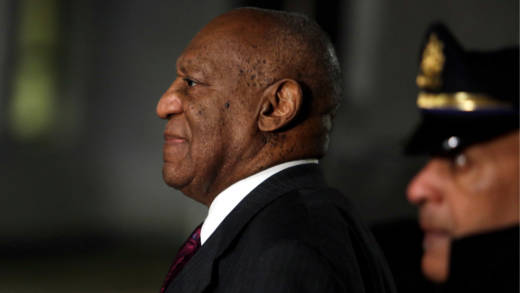“I want to see a serial rapist convicted”
Cosby initially faced sexual assault charges in court last June but jurors could not reach a unanimous decision after 52 hours of deliberation. The judge declared it a mistrial.
This time around, the seven men and five women on the panel sat in the jury box of the Montgomery County Courthouse and listened to more than two weeks of testimony from 25 witnesses. Some cried on the stand recounting how Cosby attacked them while they were in drug-induced stupors, and others attempted to discredit main accuser Andrea Constand by detailing instances of supposed deceit and inconsistencies.
“This case is about trust,” Montgomery County District Attorney Kevin Steele told jurors in his opening remarks. “This case is about betrayal, and that betrayal leading to the sexual assault of a woman named Andrea Constand.”
Constand, the only Cosby accuser whose case has triggered criminal charges, took the stand for the prosecution over two days, as she did during the first trial.
In addition to Constand, five women who have never before confronted Cosby in a criminal courtroom took the witness stand. They told the jury that the entertainer drugged and molested them in the 1980s, stories that first came to light after prosecutors reopened Cosby’s criminal case in 2015. That led more than 60 women to lodge sexual misconduct allegations against the television icon once known as “America’s Dad.”
“You remember, don’t you, Mr. Cosby?” said accuser Chelan Lasha from the stand, locking eyes with Cosby, who has remained largely impassive throughout the trial.
“I want to see a serial rapist convicted,” another accuser, Heidi Thomas, told the court, as spectators gasped at the statement.
Through it all, jurors had a front-row seat to the lawyerly slugfest that pitted three prosecutors from suburban Philadelphia against a throng defense attorneys led by Los Angeles-based Tom Mesereau, who aggressively depicted Constand as a “con artist.”
“You’re going to be saying to yourself in this trial, ‘What does she want from Bill Cosby,'” Mesereau said to jurors during opening statements. “You already know the answer: money, money and lots more money.”
To bolster this argument, the defense called star witness Margo Jackson, who used to work with Constand at Temple University. Jackson was banned from testifying during the first trial, but the judge allowed her in this time. Jackson told jurors that Constand once confided in her that she had a plan to frame a wealthy celebrity with a made-up sexual assault claim “to get that money.”
Prosecutor Kristen Feden seized on the characterization of Constand as a scheming con artist during closing arguments, saying it was Cosby who deployed his wholesome TV image to gain the trust of women he planned to incapacitate and assault.
She strode across the courtroom pointing inches away from Cosby as he sat wide-eyed at the defense table.
“The perpetrator of that con is this man!” she yelled. “Sitting right here. This is the man.”
When Constand took the witness stand, she told the jury that, one night in January 2004, Cosby gave her three blue pills he called “friends” to relax her. Instead, they rendered her defenseless, lapsing in and out of consciousness. Constand told jurors she was “jolted awake” by the feeling of his fingers in her vagina as she lay on a couch in Cosby’s home.
A couple of months later, she told the court, she attempted to confront Cosby about it.
“I wanted to know what pills he gave to me, and why he did that to me,” Constand said. “He stumbled on his words. He said, ‘I don’t know what you’re talking about.’ He said, ‘I thought you had an orgasm,’ and I had not. He would not answer my questions.”
Constand told the court that enduring two publicity-heavy criminal trials “tore my family apart,” yet when asked by prosecutor Kristen Feden why she agreed to take the stand again, Constand replied, “for justice.”
Constand faced withering questions from Mesereau on cross examination, as a part of a multi-pronged defense focused on shaking her credibility and that of the other witnesses. He probed Constand as to why she stayed in touch with Cosby after the incident, portrayed her as a desperate, cash-strapped pyramid scheme participant. Constand was also pressed about the nearly $3.4 million Cosby paid her in a 2006 civil settlement, which was previously confidential.
Cosby’s lawyers also suggested to jurors that the incident could not have happened the way she said it did, even hinting that there is a chance Cosby was not in the Philadelphia area around the time Constand said she was assaulted. The defense did not issue an outright denial of the episode at the heart of the alleged crime. Cosby has admitted that he and Constand had sexual contact in his house around 2004, but which he has long maintained it was consensual.
Legal observers have called the Cosby retrial a major test of the effects of the #MeToo movement, the wave of allegations of sexual assault lodged against prominent media figures that erupted between Cosby’s first and second trials.

9(MDAxOTAwOTE4MDEyMTkxMDAzNjczZDljZA004))

